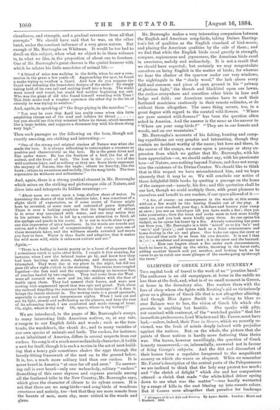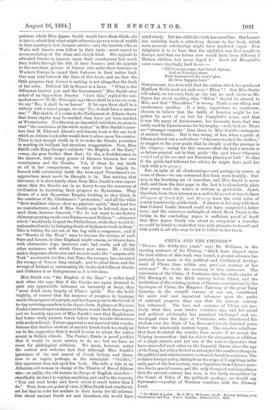GLIMPSES OF GREEK LIFE AND SCENERY.• Tins capital book of
travel is the work of no " 'prentice hand." The authoress is an old campaigner, at home in the saddle no less than at the desk, and, what is of no small moment in Greece, at home in the dormitory also. Her warfare there with the foes of sleep whom she fights with Keating's aid so victoriously gives us a glimpse of Greek life that is not altogether alluring. And though Miss Agnes Smith is as willing to bless as ever Balaam was to ban, the vision of Greek life which she presents is anything but beatific. She speaks with pity, not unmixed with contempt, of the "wretched guides" that her immediate predecessors, Lord Windsor and Mr. Eimer, must have had,—unless, indeed, their Tow- in, Greece, which we recently re- viewed, was the fruit of minds deeply imbued with prejudice against the natives. But, on the whole, the picture that she paints of those natives is hardly more flattering than theirs was. She leaves, however unwillingly, the question of Greek honesty unanswered,—or, inferentially, answered not in favour of King George's subjects. And the dirt and discomfort of their homes form a repulsive foreground to the magnificent scenery on which she waxes so eloquent. Wlien we remember Mr. Farrer's description of the central parts of the Peloponnesns we are inclined to think that the lady may protest too much; and " the shriek of delight " which she and her companions uttered—a shriek that made " the white-kilted driver spring down to see what was the matter "—was hardly warranted by a range of hills in the east blazing up into roseate colour. But if Greece were altogether that paradise for landscape
• Glimpses of Greek Life and Scenery. By Agnes Smith. London : Hurst and Blackett. 1884.
painters which Miss Agnes Smith would have them think, she Is fain to admit that what might otherwise prove a mine of wealth to that country is lost, because artists—and the tourists who, as Wales well knows, soon follow in their train—must expect no accommodation of the clean and simple kind. She appeals to educated Greeks to impress upon their countrymen how much they forfeit through the dirt of their houses ; and she appeals to the merchant princes of Greece who make their fortunes in Western Europe to spend their fortunes in their native land. One may read between the lines of this book, and see that the little progress that Greece is making is not altogether the fault of her ruler. Political life in Greece is a farce. "What is the difference betwixt you and the Government," Miss Smith once asked of an Opposition Deputy. "Just this," replied the out- spoken ass,—" if Mr. Tricoupis says there shall be a tax on oxen, we say 'No ; it shall be on horses.' If he says there shall be a railway with a broad gauge, we say No ; it shall have a narrow one.' " Her sketch of a scene in the Parliament at Athens shows that lower depths may be reached than have yet been reached at Westminster. For the rest, as impartial outsiders, we seem to read " the conclusion of the whole matter" in Miss Smith's asser- tion that M. Edmond About's well-known book is the one book which no Athens bookseller would dare to place upon his counter. There is just enough truth in it to make the Greeks powerless in meeting its brilliant but atrocious exaggeration. Now, Miss Smith calls King George's subjects "the English of the East," —nay, she goes further than that ; for she, a Scotchwoman to the marrow, finds many points of likeness between her own countrymen and the Greeks. Yet, if there be any truth at all in her comparisons, we may infer how largely in- formed with substantial truth the keen-eyed Frenchman's ex- aggerations must needs be thought to be. But waiving that inference, it is abundantly clear, from Miss Smith's own experi- ences, that the Greeks are in no hurry to use the resources of civilisation in hastening their progress to Byzantium. They dream of a new Byzantine Empire, basking, as they think, in the sunshine of Mr. Gladstone's " protection ;" and all the while " their wealthier classes show no patriotic spirit," their land has no manufactures, and, if Miss Smith may be belilved, does not need them, because forsooth, " We do not want to see factory chimneys poniing smoke over Parnassus and Helicon,"—chimneys which " would only disgust the Philhellenes, while they would de- nationalise Greeks by bringing shoals of Italians to work in them." This is letting the cat out of the bag with a vengeance ; and if we " Greeks of the West " were to become the victims of -such fears and fancies, in time England might swarm, as Greece does, with obstructive dogs, intrusive cats, bad roads, and all the other nuisances with which Greece now teems. Mi Smith makes desperate efforts ever and anon to make the " unspeagable Turk " answerable for this ; but Time, the avenger, has execrated the wrongs of Greece long enough ; and to plead them and the wrongs of Ireland as extenuating the faults and follies of Greeks and Irishmen is as disingenuous as it is frivolous.
Miss Smith sets "the English of the East" a rather hard task when she says that if the Greeks are again destined to gain any appreciable influence on humanity at large, they "must drink more largely of Plato's spirit." For she holds (rightly, of course) that the measure of progress in language marks the progress of a people, and her hopes point to the Greek of to-day reverting somehow to its classic form. A glance at Musurus Pasha's interesting translation of Dante would check these hopes; and we heartily approve of Miss Smith's view that Englishmen had better study ancient Greek before they trouble themselves with modern Greek. Yet our approval is not unmixed with wonder, because this fearless student of ancient Greek lends too ready an ear to the suggestion that it would be wise to adopt the native accent in British schools. The Pasha's Dante is proof positive that it would be most unwise to do so ; but we have no room for philological criticism. We must, however, notice the curious and welcome fact that although Miss Smith's ignorance of the real import of Greek history and litera- ture is as vague, perhaps, as the inimitable " 0 uida's," this ignorance does not spoil her book. She tells a tale of an Athenian old woman in charge of the Theatre of Herod Atticus who—so unlike the old women in charge of English churches— steadfastly declined to explain anything, and said to the tourists, "You can read books and know about it much better than I do." Now, from our point of view, if Miss Smith had steadfastly set her face to refer her readers to their books for all informa- tion about ancient Greek art and literature, she would have acted wisely. But her child-like faith has saved her. Her bound- less credulity lends a refreshing flavour to her book, which more accurate scholarship might have rendered vapid. How delightful it is to bear that the alphabet was first taught in Europe, and that our habits now would have been different if Theban children had never lisped it ! Good old Mangnall's verse comes ripplingly back to us :—
" Till Cecropa came, that friend of:man,
And on Livadia's shore
First harmonised the useful plan
He from Egyptia boro."
How pleasant, too, to be told that the nation which has produced Matthew Webb need not sigh over " Milon " ! But Miss Smith will admit, we are sure, that, as she has no such views as Mr. Sayce has about spelling, this "Milos" should be altered to Milo, and that Thucidides " is wrong. Faith is one thing, and carelessness another. If a lady, impervious to scepticism, chooses to believe that the battle of Leuctra might be for- gotten by most of us but for Campbell's muse, and that it was the spear of Aristomenes, her favourite hero, that was really used by Epaminondas for his trophy,—well, be it so. There are "stranger serpents" than these in Miss Smith's menagerie of ancient Greeks. But it was wrong of her, when a guide at Ithaca pointed out a well where " Odysseus washed his clothes,"
to suggest to the poor guide that he should read the passage in the Odyssey : wrong for this reason—that she had a minute or so before pointed out to that guide "the spot where Odysseus waded out of the sea and saw Nausicaa playing at ball." So that if the guide had followed her advice, he might have paid her back with a to quoque.
But, in spite of all shortcomings—and perhaps by reason of some of them—we can commend this book most heartily. Dul- ness is the besetting sin of travellers, and Miss Smith is never dull; and from the first page to the last it is abundantly plain that every word she writes is written in good faith. Apart, therefore, from their interest as a well-told record of travel, these
Glimpses of Greek. Life and Scenery have the solid value of a most trustworthy guide-book. A glance at her map will show
that Colonel Leake himself could not have suggested a better tour ; and the vivacious onslaught of which Mark Twain is the victim in the concluding pages is sufficient proof of itself that Miss Agnes Smith was about as competent a traveller as could be found to make that tour with pleasure to herself and with profit to all who may be led to follow in her track.



































 Previous page
Previous page